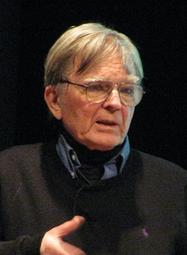Robert Coover, "who along with Donald Barthelme, John Barth and others occupied the vanguard of postmodern American fiction in the 1960s and 1970s, and who went on to a long and prolific career writing and teaching," died October 5, the New York Times reported. He was 92.
 |
|
| Robert Coover | |
Coover's first novel, The Origin of the Brunists (1966), was fairly traditional in its telling, with Webster Schott writing in the New York Times Book Review: "If he can somehow control his Hollywood giganticism and focus his vision of life, he may become heir to Dreiser or Lewis."
But Pricksongs and Descants (1969), Coover's early story collection, made it clear he had no interest in inheriting the kingdom of social realism from Theodore Dreiser or Sinclair Lewis. "Those stories firmly established his career-long interest in remixing fairy tales, exploding myths and placing only the most transparent window in front of fiction's inner machinery," the Times noted.
In an interview with the New Yorker in 2014, Coover said, "I've engaged with folk tales and fairy tales all my writing life, as part of my attempted disruption of the myths that environ and sometimes govern us."
He targeted political myths in The Public Burning (1977), a novel reimagining the case of Julius and Ethel Rosenberg, and featuring other historical figures--Richard Nixon, J. Edgar Hoover--as well as two mythic characters, Uncle Sam and the Phantom, who represented the overheated rhetoric of Cold War antagonism.
Michiko Kakutani, former Times chief book critic, called Coover "probably the funniest and most malicious" of the postmodernists, "mixing up broad social and political satire with vaudeville turns, lewd pratfalls and clever word plays that make us rethink both the mechanics of the world and our relationship to it."
During his many years as a professor at Brown University, beginning in 1979, Coover's students included the authors Rick Moody, Joanna Scott, Jim Shepard, Sam Lipsyte, Ben Marcus, and Alexandra Kleeman. Coover would alternate a semester of teaching with two or three spent writing. Marcus, now a professor at Columbia University's MFA program, said Coover "thought tenure was death," and could be "a thorn in the side of the lifers."
Lipsyte, who also now teaches at Columbia, studied with Coover as an undergraduate. "He was very much aware of his position as a part of that postmodern movement that was breaking away from American tradition in the novel," he said. "That was a big part of his teaching--to expand our mind and make us think about new modes and new approaches" and "to knock us into new places."
In a 1992 column in the Times titled "The End of Books," Coover wrote that he was "interested as ever in the subversion of the traditional bourgeois novel and in fictions that challenge linearity."
Elected to the American Academy of Arts and Letters in 1987, Coover was prolific and ambitious into late life. In 2014, he published The Brunist Day of Wrath, a thousand-page sequel to his debut novel. Huck Out West (2017) imagined Huck Finn and Tom Sawyer in the Wild West.
In recent years, he continued to publish stories in the New Yorker, and released two collections of fairy tale-influenced books through McSweeney's: A Child Again (2005) and Stepmother (2004). In 2021, he published Street Cop, a short novel with illustrations by Art Spiegelman. His other books include The Universal Baseball Association, J. Henry Waugh, Prop. (1968), Gerald's Party (1985), and John's Wife (1996).
"There's nothing necessarily wrong with myths," Coover said in a 2011 interview with the New Statesman. "We tend to need some sort of sustaining mythic notion or pattern or vision in order to get through each day. We need a little bit of structure to get out of bed, to keep going. But most of it is stifling, in some way corrupting."

